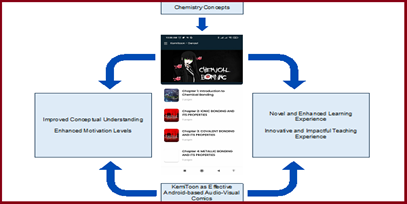
Keywords
Audio-visual comics,Chemistry,Conceptual Understanding,KemiToon,MotivationHow to Cite
(1)
Cotiangco, E. N.; Huraño, N. J.; Sodoso, E. R.; Sumagang, M. G.; Jumao-as, J. J.; Canoy, J.; Picardal, M.; Sanchez, J. M. Android-Based Audio-Visual Comics in Enhancing Conceptual Understanding and Motivation of Chemistry Concepts . Orbital: Electron. J. Chem. 2024, 16, 125-135.




The complexity of chemistry arises from its abstract nature and heavy reliance on mathematical concepts, posing significant challenges for students. Combining technology with traditional teaching, comics are used as one of the educational multimedia options because of their unique ability to infuse humor, a way to convey scientific information that can captivate people's attention and interest. This study investigated the effectiveness of Android-based audio-visual comics in teaching chemical bonding among two groups of Grade 9 science class students in a public secondary school in Cebu, Philippines. Using a causal-comparative design, a 20-item pretest-posttest method was used to measure the extent of the effect of the integration on students’ conceptual understanding; meanwhile, an adapted version of the Chemistry Motivation Questionnaire-II (CMQ-II) to measure the increased motivation of the students. A semi-structured interview was utilized to gather qualitative data for teaching experiences, while a focus group discussion was used to collect students’ experiences. Quantitative results suggested that students’ conceptual understanding significantly improved after exposure to the instructional material. Meanwhile, the four components of students’ motivation significantly increased, specifically intrinsic motivation, self-efficacy, self-determination, and grade motivation. Moreover, students’ learning experiences using the instructional material discussed in the focus group discussion revealed that it helped them understand chemistry topics better and become more motivated to learn chemistry. Thus, science educators may consider using the instructional material in teaching science concepts to enhance motivation and conceptual understanding. Furthermore, future studies would have to consider the appropriateness and suitability of the instructional material in other subject areas and grade levels.
Comments (0)